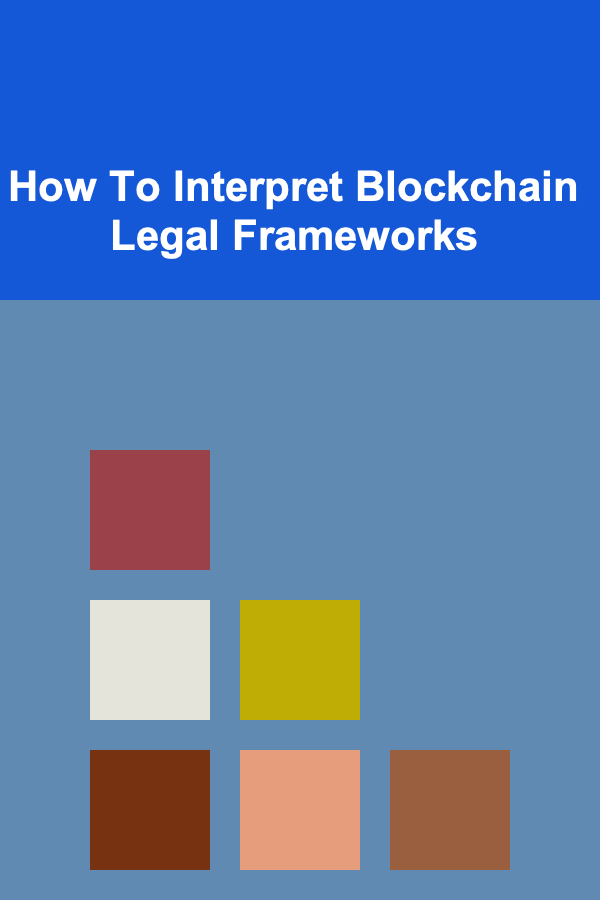
How To Interpret Blockchain Legal Frameworks
ebook include PDF & Audio bundle (Micro Guide)
$12.99$5.99
Limited Time Offer! Order within the next:

Blockchain technology has emerged as a groundbreaking innovation that challenges traditional systems of governance, finance, and data management. Its decentralized and immutable nature offers numerous advantages, including increased transparency, enhanced security, and the potential to disrupt industries ranging from banking to supply chain management. However, as blockchain continues to gain traction across various sectors, the need for a comprehensive legal framework has become more apparent.
Understanding blockchain legal frameworks is crucial for businesses, regulators, and legal professionals as they navigate the complex landscape of blockchain regulation. This article delves into the interpretation of blockchain legal frameworks, exploring the challenges, considerations, and approaches to creating a robust legal environment for blockchain technology.
The Need for Legal Frameworks in Blockchain
Blockchain technology is inherently disruptive. It operates outside traditional centralized systems, often rendering existing legal structures inadequate or inefficient. As blockchain applications expand into critical areas such as finance (through cryptocurrencies), healthcare, and government services, the absence of legal clarity becomes problematic. Several key challenges arise when attempting to apply conventional laws to blockchain-based activities:
- Jurisdictional Issues: Blockchain networks are decentralized, meaning they operate across borders, which can complicate the application of national laws. Determining which legal jurisdiction applies to transactions on a global scale is a challenge for regulators.
- Smart Contracts: Blockchain often uses smart contracts, which are self-executing contracts with the terms of the agreement directly written into code. The legal status of smart contracts and their enforceability can vary widely between jurisdictions.
- Data Privacy and Security: While blockchain offers enhanced security features, concerns about data privacy persist, especially in regions with strict data protection laws, such as the European Union's General Data Protection Regulation (GDPR).
- Tokenization: The process of creating digital representations of assets through tokens raises questions about property rights, taxation, and regulation. Legal systems are struggling to classify tokens accurately.
The Role of Legal Frameworks
A legal framework for blockchain provides a clear structure for resolving disputes, enforcing contracts, and regulating activities on the blockchain. Such a framework is vital for ensuring that blockchain technologies can operate in a compliant and legally secure manner. For blockchain to reach its full potential, the legal system must evolve alongside it, offering clarity for businesses, consumers, and regulators.
Key Legal Considerations in Blockchain Interpretation
Interpreting blockchain legal frameworks requires a deep understanding of the technology and its implications for various legal domains. Below are the key legal considerations that must be addressed when interpreting blockchain technology in a legal context.
2.1. Contract Law and Smart Contracts
At the heart of many blockchain applications is the use of smart contracts. These self-executing agreements automatically enforce the terms of the contract when predetermined conditions are met. While smart contracts have the potential to revolutionize contract law by automating processes and reducing the need for intermediaries, several legal challenges must be addressed:
- Enforceability: Traditional contract law requires that contracts meet specific criteria, such as mutual consent, consideration, and capacity. While smart contracts may meet some of these criteria, they are coded in software, which complicates the interpretation of the contract's intent and the parties' mutual agreement.
- Jurisdictional Challenges: Since blockchain operates globally, determining which legal system governs a smart contract can be difficult. Parties to a smart contract may reside in different countries, each with its own set of contract laws.
- Error Handling: Traditional contracts often include provisions for handling disputes or errors in the contract's execution. With smart contracts, once the terms are executed, they cannot be easily modified. This raises concerns about resolving errors, especially in cases where the contract's code is flawed.
2.2. Intellectual Property (IP) Rights
Blockchain technology is often used to protect intellectual property (IP) rights, such as through the use of tokenization or decentralized registries. For example, blockchain can help creators establish proof of ownership for digital works. However, the decentralized nature of blockchain poses challenges for IP law:
- Ownership and Transfer of Digital Assets: As blockchain enables the creation of digital assets such as non-fungible tokens (NFTs), it is important to establish clear ownership rules. Who owns the IP associated with an NFT, the token itself, or the content represented by the token?
- Global Enforcement: Because blockchain operates internationally, IP enforcement across borders can be complex. If an infringement occurs on a blockchain network, determining the legal jurisdiction for enforcement becomes a challenge.
- Smart Contracts and Licensing: Licensing agreements for digital IP may involve smart contracts. However, the terms of these agreements must be compliant with traditional IP law, which often requires adaptability and flexibility that smart contracts may not easily accommodate.
2.3. Privacy and Data Protection
The immutable and transparent nature of blockchain presents both advantages and challenges when it comes to privacy and data protection laws. The GDPR, for example, places strict rules on the handling and storage of personal data within the European Union, and blockchain's inability to delete or modify records presents a challenge in this context.
- Right to be Forgotten: One of the core principles of the GDPR is the right of individuals to request the deletion of their personal data. However, because blockchain records are immutable, they cannot be easily erased or altered. This creates a potential conflict between blockchain's transparent ledger and privacy laws.
- Data Sovereignty: Blockchain's decentralized nature means that data can be stored in multiple locations across the globe. This raises questions about where data is physically stored and which country's laws apply to it. Countries with strict data sovereignty laws may struggle to regulate blockchain networks that span multiple jurisdictions.
- Anonymity vs. Traceability: Blockchain can offer pseudonymity, where users' identities are not explicitly revealed. However, for regulatory and compliance reasons, such as Know Your Customer (KYC) and Anti-Money Laundering (AML) requirements, traceability of transactions is often necessary. Striking the right balance between user privacy and legal compliance is a key issue in blockchain law.
2.4. Securities Law and Token Regulation
One of the most significant legal concerns in the blockchain space revolves around the classification of tokens. In many cases, tokens represent a new form of asset that may fall under the purview of securities law. The U.S. Securities and Exchange Commission (SEC) and other regulatory bodies worldwide have begun to examine the implications of token offerings, including initial coin offerings (ICOs) and security token offerings (STOs).
- Securities vs. Utility Tokens: The key legal issue is whether tokens should be classified as securities. If a token is deemed a security, it becomes subject to securities regulations, which impose a variety of requirements, including registration, disclosure, and reporting obligations. The distinction between utility tokens (which provide access to a service) and security tokens (which represent ownership or investment) is crucial in determining the legal obligations of blockchain projects.
- Global Regulatory Uncertainty: There is no unified approach to token regulation across jurisdictions, and legal uncertainty around token classification persists. Different countries have different rules regarding what constitutes a security, making it difficult for blockchain companies to navigate the regulatory landscape.
- Taxation of Tokens: Tax authorities around the world are grappling with how to treat tokens from a tax perspective. Issues such as capital gains tax, income tax, and VAT on token transactions remain unclear in many jurisdictions.
Global Approaches to Blockchain Regulation
Various jurisdictions have taken different approaches to regulating blockchain technology and its applications. Some countries have embraced blockchain with open arms, while others have been more cautious or even restrictive. The approach taken by each jurisdiction has a significant impact on how blockchain legal frameworks are interpreted.
3.1. The United States
In the U.S., blockchain regulation is primarily focused on ensuring compliance with existing laws, such as securities law, tax law, and anti-money laundering regulations. The SEC has issued guidance on what constitutes a security in the context of token offerings, and the Commodity Futures Trading Commission (CFTC) has also weighed in on cryptocurrencies like Bitcoin, classifying them as commodities.
However, there is no federal blockchain law, and regulation remains fragmented. Several states, such as Wyoming, have taken a more proactive stance, creating favorable environments for blockchain innovation. At the same time, other states, such as New York, have introduced more stringent regulations for digital assets.
3.2. The European Union
The EU has taken a more unified approach to blockchain regulation through the development of the Digital Finance Package, which includes provisions related to crypto-assets, cybersecurity, and financial technology. The European Central Bank (ECB) has also taken steps to integrate blockchain into the financial system, while also addressing concerns related to anti-money laundering and market integrity.
The GDPR remains a significant challenge for blockchain projects in the EU, as it sets strict guidelines on the processing of personal data. The EU is also working on creating a legal framework for blockchain-based services such as digital wallets and tokenized assets.
3.3. Asia
Asian countries have varied approaches to blockchain regulation. Countries like Singapore and Japan have adopted progressive regulations that encourage blockchain development, focusing on creating clear legal guidelines for digital asset businesses. In contrast, China has imposed strict restrictions on cryptocurrencies and Initial Coin Offerings (ICOs), though the country remains active in developing blockchain-based applications in areas such as supply chain management and finance.
India's approach to blockchain is still developing, with ongoing discussions about how to regulate cryptocurrencies and blockchain use cases. While there is some uncertainty, India is exploring how to implement blockchain technology in various sectors.
3.4. Other Jurisdictions
Other countries, such as Switzerland and Estonia, have emerged as blockchain hubs by implementing favorable regulatory environments. Switzerland, in particular, has created a legal framework for blockchain-based companies, with the canton of Zug becoming a hotspot for blockchain development. Estonia has taken a similar approach, using blockchain for a wide range of government services, including e-residency and voting.
Conclusion
As blockchain technology continues to evolve, legal frameworks must adapt to ensure that blockchain operates in a compliant and secure manner. Understanding blockchain legal frameworks is complex and requires a deep understanding of both technology and law. Legal professionals must navigate challenges such as smart contract enforceability, data privacy, intellectual property rights, and token classification.
A global approach to blockchain regulation is necessary to address the cross-border nature of blockchain networks and to create a cohesive legal environment. With the right legal infrastructure in place, blockchain can realize its full potential, providing businesses and consumers with new opportunities while ensuring accountability, security, and compliance.

Crisis Management in Social Work: Responding to Tragedy and Trauma
Read More
How to Create a Minimalist Home Office Environment
Read More
How to Incorporate Whimsical Elements into Your Holiday Decor
Read More
How to Store Books and Magazines in Stylish and Practical Ways
Read More
Mastering Procurement Management: Advanced Strategies for Cost Reduction and Value Creation
Read More
10 Tips for Building a High-Performing Scrum Team Culture
Read MoreOther Products

Crisis Management in Social Work: Responding to Tragedy and Trauma
Read More
How to Create a Minimalist Home Office Environment
Read More
How to Incorporate Whimsical Elements into Your Holiday Decor
Read More
How to Store Books and Magazines in Stylish and Practical Ways
Read More
Mastering Procurement Management: Advanced Strategies for Cost Reduction and Value Creation
Read More